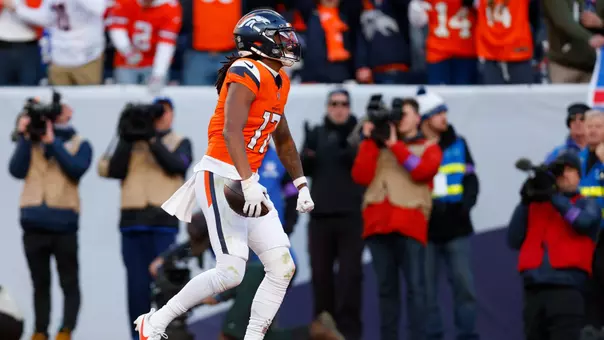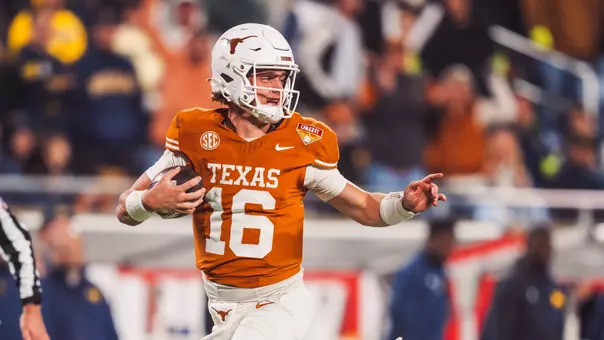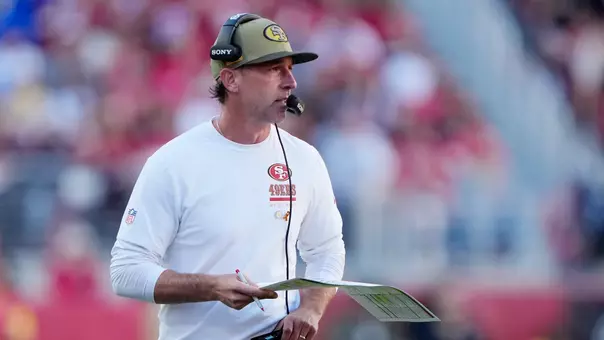The University of Texas at Austin Athletics
Bill Little Commentary: Being James Street
09.30.2013 | Football, Bill Little Commentary
The happy-go-lucky competitor we knew in college never really left - but he learned a lot since those days when winning was everything.
"Let me live in a house by the side of the road
Where the race of men go by-
The men who are good and the men who are bad,
As good and as bad as I.
I would not sit in the scorner's seat
Nor hurl the cynic's ban-
Let me live in a house by the side of the road
And be a friend to man."
Rocks in life are funny things. You can throw them; try to budge them; climb them; sit on them; lean on them, and the truth is you come to depend on them.
James Street was a rock.
Phone calls in the early morning hours are never good things. They are either a misdial or bad news. This one was the worst of news.
James Street was gone. Way too soon. Way too sudden. In the flick of an instant, an icon of Longhorns football had passed away without warning.
If you define a person by the people he knew and the things he did, James Street's was a life well lived by the time he was in his mid 20s. In an era where college football was the nation's dominant sport, he became perhaps its most famous player.
"He stood out from everybody else because he made clutch plays and he never quit. He was likeable and fun, but most of all, he won. He remains my favorite Texas quarterback of all-time," said famed author Dan Jenkins, who covered James and the Longhorns team in 1968 and 1969.
"I remember standing with the late Jones Ramsey in the press box as the fourth quarter began in the "Big Shootout" in Arkansas in 1969. Texas was behind, 14-0, and Street scrambled 42 yards for a touchdown.
"I remember Jones saying 'I had given up…I'm sure glad Street hadn't,'" Jenkins recalls. History, of course, chronicles the rest of the quarter, where Street led Texas to a 15-14 win and a national championship. Millions had watched as the Horns pulled off the comeback in the season finale of the 100th year of college football.
And with that, James Street became a "rock star" years before anybody ever came up with the phrase. He was at home in Vegas or in New York. He knew Elvis Presley and President Johnson and hung out with pro football players such as Bobby Layne and Joe Namath.
In that space and in that time, "Being James Street" was a pretty cool deal.
As a player, James was the ultimate competitor, and it didn't matter what the game was, he was in it to win. But as the shock of the morning gave way to the sadness of the day, we get to talk about the man, and not the game.
"Being James Street" has meant a lot of things to a lot of people. As a football and baseball player at Texas, it meant a guy who was there to compete, and to win. And win was what he did. As a quarterback at Texas, he started 20 football games, and the team won them all. Twenty and "0". National champions. As a pitcher in baseball, he was just about as successful.
With a wicked curve ball that made him a second-team All-American, he was part of teams that went to the College World Series every year he played, and finished in the top four each of his last two seasons.
He was named the Most Valuable Player on the 1969 National Championship football team, and all three years that he played baseball.
Throughout his college career, "Being James Street" had meant leadership, and as a star pitcher and a quarterback, he often led by example.
In June of 1970, with his football career behind him and the College World Series over, James Street's athletic career ended. Now, it was time for something else. "Being James Street" meant that it was time to figure out what he was going to do with the rest of his life, and to do that, he had to first figure out who James Street really was.
I remember a message the Baptist preacher in Winters, Texas, once brought to my elementary school. He was telling us something that would impact my life, and I know James got a similar message along the way.
"You have to ask yourself these questions," he said. "They are the same questions your parents will ask you when you go out at night. 'Where are you going? Who are you going with? And what are you going to do when you get there?'"
What do you do with your life when the shouting and tumult dies?
As a kid, I once put together a book of poems, and one of them was a little rhyme called "Sometimes." "Across the Fields of Yesterday," it went, "he sometimes comes to me…the little lad just back from play, the lad I used to be. And yet, he smiles so wistfully, once he has crept within, I wonder if he hopes to find The Man I Might Have Been."
He had taken charge of a Texas offense in football, he had taken charge when he walked to the mound as a pitcher in baseball.
James Street, star player, had a decision to make. The early years following his college career hadn't been seasons in the sun. Not unlike many of us children of the 60s, there was a space where the moments were good, and not-so-good. And some were just flat lousy. It had been a spell since "Being James Street" was really fun. Now, he had to take charge of his life.
Do you spend your life living with what was, and wondering what might have been?
Where are you going? Who are you going with? What are you going to do when you get there?
What James Street did was become perhaps the best structured settlement financial advisor in the country. He helped people who had been touched by tragedy find a way to secure their assets so they could live comfortably for the rest of their lives.
"I didn't know James in the dark time," a leading Austin attorney told me. "But what I appreciate about him is that he started a company in a business that he really didn't know a lot about and he learned.
"He learned the business, and he never used his days as a player as a crutch. He used it as an inspiration. It became about his humility, rather than some kind of diseased conceit. He was the best in the business at what he did, and he was a great guy."
Some parts of "Being James Street" never changed.
The James Street we knew in later years was not only a successful businessman, he was a caring, devoted husband, father and grandfather. The parenting part came naturally. Throughout his career at Texas and beyond, James had no greater fan and supporter than his mother.
Despite an incredible schedule, he always had time for people. His self-deprecating humor fostered his larger-than-life image. He had a way of making it seem, in the moment, that he always had time for you, and talking with you was the most important thing he had to do in his life.
That was true whether you were somebody like a great friend such as Mack Brown, or a struggling fellow traveler who was trying to whip the disease of alcoholism - just as James had done. And he never appeared condescending. Once, at a dinner at in New York, a waiter was taking drink orders. Martinis, cold beer, wine. Finally the waiter came to James, who politely said, "No thanks, I've had enough." He just didn't say when. James took his last drink more than 30 years ago.
We will remember his friendship, his honesty, his smile, his little bit of a song, his infectious humor and his uncanny homespun wisdom.
The happy-go-lucky competitor we knew in college never really left -- he was still a kid at heart -- but he learned a lot since those days when winning was everything.
When his son, Huston, was playing for Westlake High School and they had lost to Midland Lee in the football state championship game, James talked to him after the game.
"Were you as prepared as you could possibly be?" he asked. Huston said yes. "Did you give your best effort on every play?" Again the answer was yes.
"Then," James said, "you have done everything you could to win, and the other team was better that day. Go over there and shake hands and give them the credit."
"Credit" was something James never took for himself. In his time at Texas, it would be about his teammates. As a businessman, it was about the people in his company, The James Street Group -- one of the largest structured settlement firms in America. When it came to raising kids, it was about his wife, Janie. He was one of the most giving people -- of his time, his talent, and his money -- I have ever met.
Sunday James and Janie had returned from a trip to San Francisco to see Huston's team -- the San Diego Padres -- play the final game of their season. He was proud of Huston's sports career, but equally proud of his oldest son Ryan (a successful Austin architect), and the younger brothers -- the twins Juston and Jordan -- and the youngest, Hanson. Daughters-in-law and grandchildren also arrived to make a huge impact in his life.
In the summer of 2002, when Huston was a freshman, the Longhorns won the College World Series, and by chance the Street family joined us at an Omaha restaurant called "Mr. C's" after the game. We put the NCAA championship trophy at one end of the table as the food arrived, and each youngster waited patiently for all to be served. Then, they held hands and said a prayer, giving thanks for the food, and the day.
And that is the image we are left with. In a very real sense, he was larger than life. But for those who knew him and whose lives he touched, "Being James Street" meant a friend who could lift your day.
That is why that poem at the beginning of this commentary seemed to matter so much.
"Let me live in a house by the side of the road
Where the race of men go by-
The men who are good and the men who are bad,
As good and as bad as I.
I would not sit in the scorner's seat
Nor hurl the cynic's ban-
Let me live in a house by the side of the road
And be a friend to man."
It defines him, it validates him. Because that's what being James Street was really all about.





